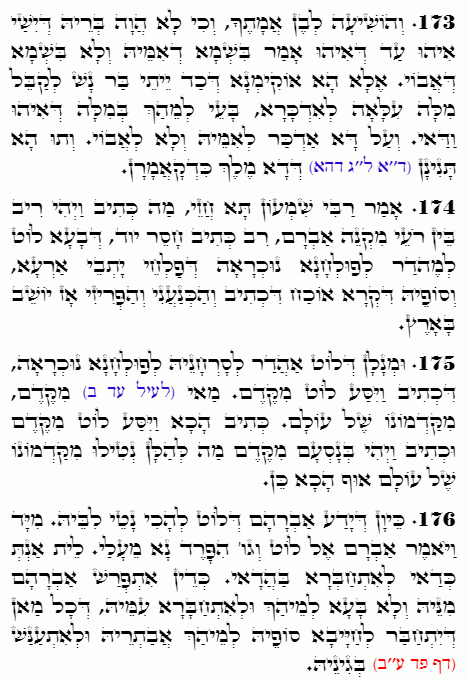Daily Zohar # 4696 – Lech Lecha – Please separate from me
Daily Zohar 4696

Hebrew translation:
174. אָמַר רַבִּי שִׁמְעוֹן, בֹּא רְאֵה מַה כָּתוּב. וַיְהִי רִיב בֵּין רֹעֵי מִקְנֵה אַבְרָם, רִב כָּתוּב חָסֵר יוֹ”ד. שֶׁרָצָה לוֹט לַחֲזֹר לַעֲבוֹדָה הַזָּרָה שֶׁעוֹבְדִים יוֹשְׁבֵי הָאָרֶץ, וְסוֹף הַכָּתוּב מוֹכִיחַ, שֶׁכָּתוּב וְהַכְּנַעֲנִי וְהַפְּרִזִּי אָז יֹשֵׁב בָּאָרֶץ.
175. וּמִנַּיִן לָנוּ שֶׁלּוֹט חָזַר לְסוּרוֹ הָרָע לַעֲבוֹדָה זָרָה? שֶׁכָּתוּב וַיִּסַּע לוֹט מִקֶּדֶם. מַהוּ מִקֶּדֶם? מִקַּדְמוֹנוֹ שֶׁל עוֹלָם. כָּתוּב כָּאן וַיִּסַּע לוֹט מִקֶּדֶם, וְכָתוּב וַיְהִי בְּנָסְעָם מִקֶּדֶם. מַה לְּהַלָּן נְסִיעָה מִקַּדְמוֹנוֹ שֶׁל עוֹלָם – אַף כָּאן כֵּן.
176. כֵּיוָן שֶׁיָּדַע אַבְרָהָם שֶׁלְּכָךְ נָטָה לִבּוֹ שֶׁל לוֹט, מִיָּד – וַיֹּאמֶר אַבְרָם אֶל לוֹט וְגוֹ’ הִפָּרֶד נָא מֵעָלָי. אֵינְךָ כְּדַאי לְהִתְחַבֵּר עִמִּי. אָז נִפְרַד מִמֶּנּוּ אַבְרָהָם וְלֹא רָצָה לָלֶכֶת וּלְהִתְחַבֵּר עִמּוֹ, שֶׁכָּל מִי שֶׁמִּתְחַבֵּר לָרָשָׁע, סוֹפוֹ לָלֶכֶת אַחֲרָיו וּלְהֵעָנֵשׁ בִּגְלָלוֹ.
.
Zohar Lech Lacha
Continued from previous DZ
#173
“וְהוֹשִׁיעָה לְבֶן אֲמָתֶךָ” “And save the son of Your maidservant” (Psalms 86:16). The question is asked: Was he not the son of Jesse (יִשַׁי)? Why did he need to mention his mother’s name rather than his father’s name? The answer was given: When a person mentions himself to receive something from above, he must do so in a clear and indisputable way. Therefore, he mentioned his mother, “the son of Your maidservant,” not his father. Furthermore, we have learned that this refers to the King, as we said before. He did not pray for himself but for Nukva, who is called King in a simple sense. This is why he mentioned his mother, who represents Nukva, rather than his father.
#174
Rabbi Shimon said, “Come and see what is written: “וַיְהִי רִיב בֵּין רֹעֵי מִקְנֵה אַבְרָם” ‘And there was strife between the herdsmen of Abram’s cattle’ (Genesis 13:7). The word ‘strife’ (רִב, riv) is written without the letter yud (י), which indicates that Lot wanted to return to the idolatry practiced by the inhabitants of the land. The end of the verse confirms this, as it says, “וְהַכְּנַעֲנִי וְהַפְּרִזִּי אָז יֹשֵׁב בָּאָרֶץ” ‘And the Canaanites and Perizzites then dwelled in the land,’ implying that Lot wanted to worship idols like them. The missing yud in ‘רִב’ ‘strife’ signifies idolatry. This connects to the verse “ורב יעבוד צעיר” ‘and the elder shall serve the younger’ (Genesis 25:23) and to Esau said to Jacob, “יש לי רב” ‘I have much’ (Genesis 33:9), while Jacob replied, “יש לי כל” ‘I have everything’ (Genesis 33:11). Likewise, the phrase “וערב רב עלה אתם” a mixed multitude went up with them (Exodus 12:38) relates to this concept.
Notes:
This Zohar passage suggests that the missing yud in ‘strife’ (רב) signifies a spiritual deficiency associated with Lot’s attraction to idolatry, indicating his disconnection from Abram’s dedication to Hashem. Lot’s behavior reflects a broader theme of material attachment and deviation from the spiritual path, paralleling Esau’s mindset of ‘I have much’ and the Erev Rav, or mixed multitude, who were prone to divided loyalties. By highlighting these connections, the Zohar teaches that true spiritual alignment requires dedication to divine unity, as exemplified by Abram and Jacob, and that deviation from this path leads to discord and separation from holiness.
#175
And how do we know that Lot returned to his former ways of idolatry? It is written, “וַיִּסַּע לוֹט מִקֶּדֶם” “And Lot journeyed from the east” (Genesis 13:11). What is the meaning of “from the east” (מִקֶּדֶם, mi-Kedem)? It means from the Ancient One of the World (refers to the Creator of the world). Here it says, “And Lot journeyed from the east,” and it is also written, “וַיְהִי בְּנָסְעָם מִקֶּדֶם” “And it came to pass as they journeyed from the east” (Genesis 11:2), (referring to the people who built the Tower of Babel). Just as they distanced themselves from the Ancient One of the World there, so too did Lot here.
#176
Once Abraham realized that Lot’s heart had inclined toward idolatry, he immediately said to Lot, “הִפָּרֶד נָא מֵעָלָי Please separate from me” (Genesis 13:9). You are not worthy to be connected with me.” So Abraham separated from Lot and did not want to be connected with him any longer. Anyone who associates with a wicked person will ultimately follow in his ways and be punished.
Notes:
The Zohar uses Abraham’s separation from Lot to illustrate the importance of maintaining spiritual integrity by avoiding associations with those who stray from righteous paths. Abraham recognizes Lot’s attraction to idolatry and understands that continued connection would compromise his spiritual purity. This passage teaches that distancing oneself from negative influences is essential for those dedicated to righteousness, as close association with the wicked can lead to moral compromise and shared consequences. Abraham’s actions remind us of the importance of relationship discernment, encouraging a commitment to spiritual boundaries that preserve one’s integrity and connection to Hashem.
{||}

 Previous: Lech Lecha
Previous: Lech Lecha

